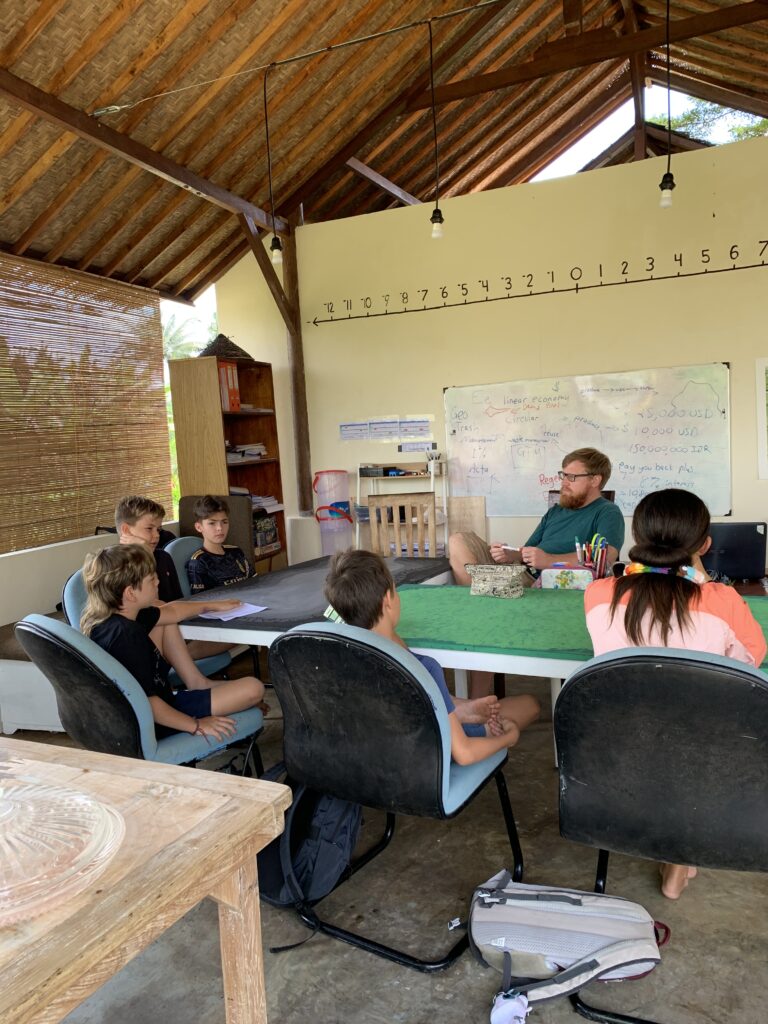In line with its commitment to sustainability, Empathy School has taken a bold step by banning non-recyclable products from its premises. This policy is not only about reducing waste but also about instilling a mindset of environmental responsibility among its students.
One morning, as the children gather for their class, a curious scene unfolds. Mrs. Sari, one of the beloved teachers, notices a student, Arjun, holding a plastic wrapper from his snack.
“Arjun, can I see that wrapper for a moment?” Mrs. Sari asks gently.
Arjun hands it over, a bit puzzled. Mrs. Sari holds it up for the class to see. “Does anyone know why we might talk about this wrapper today?”
A few hands shoot up, and after a few responses, Mrs. Sari nods. “That’s right. This wrapper isn’t recyclable, which means it can harm our environment because it doesn’t break down naturally. At Empathy School, we try to avoid these kinds of materials. Can anyone think of why we do that?”
The children offer various answers, touching on harm to wildlife and pollution. Mrs. Sari listens and then elaborates. “Exactly, everyone. Every non-recyclable item we refuse to use means one less piece of waste that could end up in our oceans or landfills. It’s about making choices that protect our beautiful island and our planet.”
She hands the wrapper back to Arjun with a smile. “Let’s think about what we can use instead of this, something that we can reuse or that is recyclable. Any ideas?”
The discussion that follows is lively, with suggestions ranging from reusable containers to biodegradable packaging. It’s clear that the policy at Empathy School isn’t just about following rules; it’s about understanding and embracing them. Through these everyday interactions, the school fosters a culture where sustainability is not an obligation but a natural choice, deeply ingrained in the way students think and act.
Later that week, the topic of making eco-conscious decisions surfaces again during a classroom discussion about local wildlife. Mrs. Sari, eager to connect the children’s daily actions to broader environmental impacts, initiates a dialogue that links everyday choices to the health of the ecosystem.
“Today, let’s talk about our friends in the forest and the ocean,” Mrs. Sari begins, pointing to pictures of Bali’s diverse wildlife on the classroom walls. “Can anyone tell me how our choices, like the snacks we bring or the things we throw away, might affect these animals?”
Several students chime in with thoughts about litter and pollution. Building on their responses, Mrs. Sari introduces a new angle. “You’re all correct. When we choose products that can be recycled or are made from sustainable materials, we help reduce pollution. This means cleaner forests and oceans, and healthier homes for all creatures.”
She continues, turning the conversation into a more interactive session. “Let’s imagine each one of us is an animal living in Bali’s forests or oceans. What kind of home would you want? What choices would you hope humans would make?”
As the children excitedly pick their favorite animals and describe their ideal environments, Mrs. Sari guides the conversation towards the impact of single-use plastics and other pollutants. “See, when we pick something up at the store, or decide how to throw something away, we’re making a choice about the kind of world these animals live in. Each choice might seem small, but together, they add up to big changes.”
The session culminates in a group activity where students create posters that depict the eco-friendly choices they can make, such as using reusable water bottles, avoiding products with excessive packaging, and participating in local clean-up drives. Each poster is a pledge, a visual reminder of their role in fostering a healthier environment.
Through these discussions and activities, Mrs. Sari isn’t just teaching facts about conservation; she’s empowering her students with the understanding that they have agency in shaping a sustainable world. This hands-on, hearts-on approach at Empathy School ensures that the lessons of environmental stewardship are not only learned but lived.


 Previous Post
Previous Post